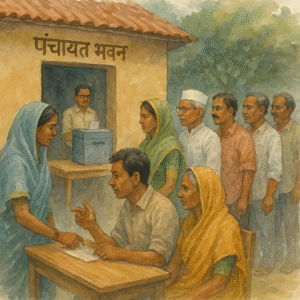Simplified Explanation of the Judgment
In Letters Patent Appeal No. 271 of 2019, decided on 31 May 2021, the Patna High Court upheld the dismissal of an employee who remained absent from duty for an extended period without authorization and later sought voluntary retirement and pension benefits. The Division Bench comprised Hon’ble the Chief Justice and Hon’ble Mr. Justice S. Kumar, and the order was delivered through video conferencing, as was the norm during COVID-19 restrictions.
The appellant had joined the State service in 1979. In 1995, he applied for leave for three months starting from 10 May 1995, which was duly sanctioned. However, after the completion of the sanctioned leave, he failed to report back for duty. His request for extension of leave, made through a letter dated 1 August 1995, was rejected by the competent authority on 16 January 1996. Despite this, the appellant continued to remain absent from duty.
Subsequently, on 1 February 1996 and 16 February 1996, the appellant submitted representations seeking voluntary retirement under Rule 74(b)(i) of the Bihar Service Code, citing that he had crossed 50 years of age. However, his request was rejected on 8 March 1996 on the ground that he was unauthorizedly absent from duty. The appellant did not challenge that rejection at the time, and consequently, disciplinary proceedings were initiated against him.
During the inquiry, all principles of natural justice were observed—meaning he was informed and given opportunities to respond—but he chose not to participate in the proceedings. The disciplinary authority, finding him guilty of unauthorized absence and indiscipline, passed an order on 11 October 2000, dismissing him from service.
Shockingly, the appellant approached the High Court only in 2019, nearly 19 years after his dismissal, by filing CWJC No. 1185 of 2019. The Single Judge dismissed the writ petition on grounds of extreme delay and lack of merit.
Aggrieved by that decision, the appellant filed this Letters Patent Appeal.
During the hearing, the appellant’s senior counsel, Mr. Yogesh Chandra Verma, relied upon the Supreme Court’s decision in D.V. Kapur vs. Union of India (1990) 4 SCC 314, arguing that the right to pension is a vested right and should not be denied even in cases of dismissal. However, the High Court found this argument misplaced.
Court’s Findings and Reasoning:
- Delay and Staleness of Claim:
- The Court observed that the appellant had approached the court after an unexplained delay of nearly two decades. Such a stale claim, the Bench said, cannot be entertained.
- The delay indicated a complete lack of diligence and seriousness on the part of the appellant.
- No Illegality in the Single Judge’s Order:
- The Division Bench noted that the Single Judge had dealt with all issues, both factual and legal, and the findings were sound and well-supported by the record.
- Right to Pension Governed by Service Rules:
- The Bench clarified that the right to pension is not an automatic entitlement but is governed strictly by service conditions and applicable rules.
- Under the Bihar Service Code, an employee who is dismissed from service forfeits his claim to pension.
- Since the appellant was dismissed after due disciplinary proceedings, he was not eligible for pension.
- Principles of Natural Justice Fully Met:
- The Court confirmed that the disciplinary process was fair, transparent, and in compliance with natural justice. The appellant was notified at every stage but deliberately chose not to participate.
- Supreme Court Judgment Inapplicable:
- The Court distinguished D.V. Kapur vs. Union of India from the appellant’s case, holding that it did not apply because the appellant had been lawfully dismissed and, therefore, his pension claim stood extinguished under service rules.
Based on these reasons, the Bench dismissed the appeal as devoid of merit and concluded that there was no legal basis to interfere with the Single Judge’s order.
Significance or Implication of the Judgment
- For Government Employees: This judgment reinforces that unauthorized absence without sanctioned leave can lead to dismissal, and dismissed employees lose pension rights unless service rules provide otherwise.
- For Retired or Dismissed Officials: A right to pension is not absolute—it depends on continuing good conduct and compliance with service norms.
- For Public Administration: The case upholds administrative discipline and sets a precedent that the courts will not entertain belated claims from employees who remain inactive for decades.
- For the Legal Community: The judgment underscores that service-related claims must be filed promptly; courts are reluctant to condone long, unexplained delays.
Legal Issue(s) Decided and the Court’s Decision (with Reasoning)
- Whether the appellant’s 19-year delay in filing the writ petition could be condoned.
- Decision: No. The delay was excessive and unexplained.
- Whether dismissal from service disentitles an employee from receiving pension.
- Decision: Yes. Under service rules, dismissal results in forfeiture of pensionary benefits.
- Whether the appellant was denied natural justice in disciplinary proceedings.
- Decision: No. He was given full opportunity but chose not to participate.
- Whether the precedent in D.V. Kapur vs. Union of India applied.
- Decision: No. That case was factually distinct and did not protect dismissed employees.
Judgments Referred by Parties
- D.V. Kapur vs. Union of India, (1990) 4 SCC 314.
Case Title
Letters Patent Appeal No. 271 of 2019 in CWJC No. 1185 of 2019 — Appellant vs. State of Bihar & Ors.
Case Number
L.P.A. No. 271 of 2019.
Citation(s)
2021(2) PLJR 747
Coram and Names of Judges
Hon’ble the Chief Justice and Hon’ble Mr. Justice S. Kumar.
Names of Advocates and who they appeared for
- For the Appellant: Mr. Yogesh Chandra Verma, Senior Advocate; Mr. Md. Anisur Rahman, Advocate.
- For the Respondents: Mr. Anjani Kumar, AAG-4.
Link to Judgment
https://patnahighcourt.gov.in/viewjudgment/MyMyNzEjMjAxOSMxI04=-yZ–am1–WtQeRZfQ=
If you found this explanation helpful and wish to stay informed about how legal developments may affect your rights in Bihar, you may consider following Samvida Law Associates for more updates.








